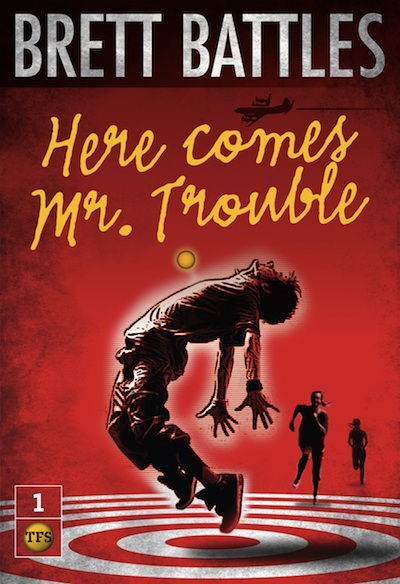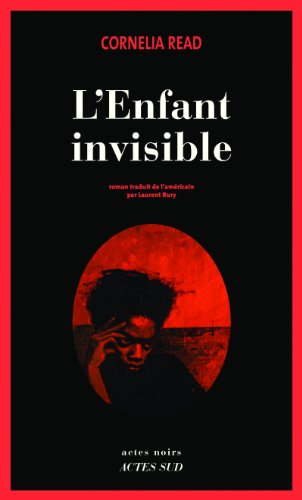After reading Tess’s and JD’s posts from the previous 2 days, I thought about changing what I was going to share with you today. I mean, after all, it’s definitely BSP, and after the important topics we’ve been discussing here, I wasn’t sure if it was the right thing to do.
Two things stopped me. First, one of the secondary themes of the book I wanted to tell you about is bullying, and second, this is my penultimate post as a Murderati regular, so what better time to discuss it? In view of all this, I hope you’ll forgive the BSP…
 Unlike the other two books I’ve mentioned lately, the book I just released is a little different. HERE COMES MR. TROUBLE is my first foray into the world of younger readers. Technically I think it would be considered a cross between middle school and tween genres, but in reality can be enjoyed by anyone 10 and up.
Unlike the other two books I’ve mentioned lately, the book I just released is a little different. HERE COMES MR. TROUBLE is my first foray into the world of younger readers. Technically I think it would be considered a cross between middle school and tween genres, but in reality can be enjoyed by anyone 10 and up.
It’s a mix of reality and my own brand of mythology, with humor, suspense, and more than a couple scary moments thrown in. Oh yeah, and thrills, too. I can’t get away from that.
I can’t tell you how much fun this was to write. I’ve wanted to work in the middle school/YA market for a while. Part of it is because I read and love the genre books, but probably the biggest reason is that my kids are in that reading group. I think some of the most innovative and interesting work is being done for readers 20 and under.
To say MR. TROUBLE holds a very special place in my heart, would be an understatement. Here’s a bit about the book:
ARE YOU LOSING THINGS?
ARE PEOPLE YOU KNOW ACTING STRANGE?
IS SOMEONE CLOSE TO YOU MISSING???
DO YOU FEEL LIKE THINGS ARE BEYOND YOUR CONTROL?
ARE YOU IN…TROUBLE?
When Eric Morrison sees the advertisement, he doesn’t know which is more surprising—the ad’s sudden appearance or the fact that his answer to every question is YES!
Not only can’t he find things, but the bullies at school are suddenly picking on him for no reason, and, worse yet, his mother has disappeared but he seems to be the only one who’s noticed. Even his best friend Maggie thinks he’s only run into a little bad luck.
But if Eric thinks his life is upside down now, it’s nothing compared to what’s about to happen when Mr. Trouble and the Trouble family arrive to assist him in solving his problems.
One thing’s for sure—Eric will never see the world in the same way again.
If that caught your interest, I guarantee what you’ll find is a wild ride that you’ll enjoy no matter how old you are. Currently it’s available as an ebook, priced at $2.99 from all the normal outlets (links below). By the end of the month a trade paperback version will also be available through Amazon.com.
If I could ask your help…MR. TROUBLE may not necessarily be for you, but you may know someone who might enjoy it. I grateful request is that if you could, please pass the information about the book on to them.
It’s a great story with wonderful characters, and, yes, I know I’m biased. But I truly believe this.
Here are those promised links:
HERE COMES MR. TROUBLE in the Amazon Kindle Store
HERE COMES MR. TROUBLE in the Barnes & Noble Nook Store
HERE COMES MR. TROUBLE at Smashwords.com
HERE COMES MR. TROUBLE in the Amazon UK Kindle Store
And if you’d like to read more, here’s the first chapter:
1
It started with a guuuuuuurgly suuuuuuuck.
Eric Morrison twisted around, trying to see what had caused the noise.
“Are you going to just sit there all afternoon?”
He would have sworn the sound had come from the other side of the classroom, but he didn’t see anything over there that could have caused it.
Please tell me I’m not hearing things, too.
As he started to turn back around, someone punched him in his arm. “Hey, are you ignoring me?”
He glanced over his shoulder. Maggie Ortega was standing right next to his desk. He’d been concentrating so hard on the gurgly suck he hadn’t heard her walk up.
“Why’d you do that?” he asked, rubbing the spot where she’d hit him.
She stared at him over the top of her glasses as if he’d lost his mind. “The bell? It went off like two minutes ago. You’re usually the first one out the door.”
Eric glanced at the clock hanging at the back of the classroom. Two fifty-two p.m. School was out. How had he missed that?
“Thanks,” he said. He gathered his books and started shoving them in his backpack. “I guess I wasn’t paying attention.”
She looked down at him for a few seconds, then said, “What’s wrong with you?”
What’s not? “What do you mean?”
“You’ve been acting all weird for days now. Stop it. I don’t like it.”
“No, I haven’t,” he said.
She rolled her eyes. “Yes, you have,” she said, heading for the door.
She was right and Eric knew it. He had been acting weird, but given what was going on, how else was he supposed to act?
“Everything all right back there?” Mrs. Bernhardi asked from her desk at the front of the room. She was their sixth-period English teacher.
“Yeah. Fine,” he said as he stood up.
“Eric, I expect you to have your essay in on time next Monday. It’s not like you to fall behind.”
“Yes, ma’am.”
Like he needed that reminder. Still, just like Maggie a few seconds earlier, Mrs. Bernhardi was also right. It wasn’t like him.
He was a good student who always got his work in on time in the past. But for the last two weeks, even though he was sure he’d put his finished assignments in his backpack, when it came time to turn them in, they weren’t there. Math, history, English—it didn’t matter.
It almost felt like he was going crazy.
Actually, maybe not almost, he thought. If I am going crazy, that would explain everything.
“Hurry up!” Maggie called from the doorway.
“Have a nice afternoon,” Mrs. Bernhardi said.
“You, too,” Eric replied quickly, then headed for the door.
The main corridor of Valley View Middle School was nearly deserted as they headed toward the front exit.
“Come on, come on,” Maggie said.
“If you’re in a hurry, don’t let me hold you back,” Eric said. “I’ll just see you tomorrow.”
She whirled around, stopping right in front of him. “Tomorrow? What do you mean tomorrow?”
“I’m just saying, if you need to be somewhere, I don’t want to be the one who makes you late. I know you hate that.”
She did hate it, but that wasn’t the real reason Eric was urging her to go on without him. Unlike the rush she seemed to be in, he definitely was not in a hurry. Chances were there’d be another one of the Neanderthals waiting to mess with him on his walk home. It had been happening almost every day lately, since about the same time he’d started forgetting his homework.
Plus there was another reason he wasn’t anxious to get going. Eric really didn’t want to be at his house at all, not if it meant opening his front door again and finding out his mother was still gone. It would be the fourth day in a row.
His dad had told him she’d gone on a business trip, like it was a normal event, and had been completely unconcerned about the fact she hadn’t said goodbye to either of them before she left. But it wasn’t normal. Not even close. And skipping goodbyes? No way.
Eric’s mom worked at a small beauty salon in town. She didn’t go on vacations, let alone business trips. “Time away means time we’re losing money. And we can’t afford that.” How many times had he heard her say that?
“Have you forgotten what we’re supposed to do today?” Maggie asked.
Guuuuuuuuuurrrrrgly suuuuuuuuuuuuuuuck.
Eric turned his head, trying once more to pinpoint where the odd noise was coming from. “Did you hear that?” he asked. It sounded both distant and right around the corner.
“Hear what?”
“That sound.”
“What sound? I didn’t hear anything.” She crossed her arms and narrowed her eyes. “You’re just trying to distract me, aren’t you? Well, that’s not going to happen. We agreed to go to the library this afternoon to work on our China report, remember? Now, come on.”
The China report. Right.
She took off down the hallway at a pace that was more a run than a walk. After a deep breath, Eric started after her.
• • •
The Tobin City Library was a single-story building about three times larger than Eric’s house. It was only six blocks from the school so the walk didn’t take them long. But because they had gotten a late start—Eric’s fault, as Maggie pointed out several times on the way over—the only open table when they got there was the one nearest the librarian counter.
“Great,” Maggie said as she dropped her bag on top.
Mrs. Kim, the head librarian, looked over, one eyebrow arched high into her forehead. “Shhhh!”
Mrs. Kim was the reason no one wanted that particular table. She could hear everything you said. The second you started goofing around she would “Shhhh” you and remind you that if you weren’t there to study, you were welcome to leave.
“Sorry, Mrs. Kim,” Maggie said, glaring at Eric.
As soon as they sat down, Maggie pulled a thick folder of loose papers out of her bag and slid it across the table to him.
“You’re responsible for the part about the Great Wall,” she said.
Eric picked up the folder. “What is this?”
“Research I printed out from the Internet last night.”
He looked at a couple of the pages. “You printed all this out last night?”
She sat back. “Well, given the way you’ve been acting lately, I knew you weren’t going to do it.”
He ignored that and asked, “Why am I responsible for the Great Wall? Aren’t we supposed to decide who does what together?”
She stared at him, her face blank.
After a moment, he said, “Fine. I’ll take the Great Wall.” He thought about asking what she was going to work on but was afraid she might snap at him again, so he said nothing and glanced through the pages instead.
“You’re going to have to read them,” Maggie said.
“I know. I’m just trying to get an idea of what’s here.”
She scowled, pulled out another equally thick folder and started going through it.
After twenty minutes, Eric leaned back and rubbed his eyes. He’d only made it about a third of the way through the folder but he was seriously thinking about skipping the rest. He was sure he already had more than enough information. The only problem was Maggie. Since she’d taken the time to print everything out, she probably expected him to read it all.
He gave his eyes one more rub, then opened them. As annoying as it was, he was probably going to have to—
He suddenly became aware that there was someone sitting in the chair next to him. He turned his head just enough so he could see who it was and immediately wished he hadn’t.
Filling the chair beside him was the six-foot-two, two-hundred-and-who-knew-how-many-pound solid body of terror known as Peter Garr. That was his legal name, anyway. To most of the kids at school he was known as King of the Jerks.
In the two weeks since Eric had become the victim of choice for after-school intimidation, the one guy who hadn’t bothered with him yet was Peter Garr. Apparently, that was about to change.
With his oily blond hair hanging partially over his face, Peter sneered long and hard at Eric, then opened a car magazine that was sitting on the table and started looking through it.
I didn’t even hear him sit down.
With a shudder, he returned to Maggie’s printouts. But the words refused to cooperate and he soon found himself reading the same sentence over and over and over.
Focus!
Just as Eric was starting to relax enough to understand what was on the page, Peter set a meaty hand on the table. He flexed his fingers then curled them into a fist as he turned his head just enough so that he could look Eric in the eye.
Eric wanted to turn away but Peter’s stare held him in place.
The corner of Peter’s mouth inched upward and he began a laugh so low that Eric almost didn’t hear it. It was nearly half a minute before he turned back to his magazine.
“What are you doing?” Maggie asked. “You can’t be done yet.”
Had she not seen what just happened?
“Nothing. I was just…never mind.” He returned his attention to the folder, but just as he started to read a new page he heard the noise again.
Guuuuu–
His head snapped around, scanning the area behind him. It was close. So very close.
–uuuuuuuuuuuu–
But there was nothing there.
–uuuuuuurrr–
He looked back at Maggie. “Tell me you hear it now,” he said, his voice raised so he could be heard over the sound.
–rrrgly suuuuuu–
“Quiet,” Maggie whispered, her eyes wide.
“You hear it, right?”
–uuuuuuuuuck.
“Why are you talking so loud?”
“Shhh,” Mrs. Kim said from behind the counter.
“Yeah. Shut up,” Peter said beside him in an oddly monotone voice.
Eric turned and looked back again. It had to be there somewhere. But all he could see were bookcases.
Must be in one of the aisles.
He pushed himself out of his chair.
“Where are you going?” Maggie asked.
Peter looked at him as if he was interested in the answer, too.
“The sound,” Eric said.
“What sound?” she asked.
Guuuuuuuuuurrrrrgly suuuuuuuuuuuuuuuck.
“That sound.”
Peter, who had been obviously listening to their conversation, narrowed his eyes as if he didn’t quite understand what Eric was talking about but thought he should.
Maggie shrugged. “The only thing making any noise is you.”
“Shhhhhh,” Mrs. Kim commanded.
Eric shook his head. “Never mind.”
If he was right, the sound was coming from just the other side of the nearest bookcase.
Guuuuuuuuuurrrrrgly suuuuuuuuuuuuuuuck.
He walked around it and stopped at the end of the aisle.
Guuuuuuuuuurrrrrgly suuuuuuuuuuuuuuuck.
No question about it. The gurgly suck was coming from somewhere down there and it seemed to be speeding up. But he couldn’t see anything that could be causing it.
Cautiously, he entered the aisle.
Guuuuuuuuuurrrrrgly suuuuuuuuuuuuuuuck.
When he’d gone halfway down the row, the sound grew so loud he had to put his hands over his ears just to think straight. He looked back the way he’d come, expecting to see a crowd of people gathered there wondering what was making all the racket, but there was no one.
Was he really the only person who could hear it?
He peered through the bookcase back at the table where he’d been sitting. Maggie was writing something in her notebook and Peter appeared engrossed in his magazine. Behind them, Mrs. Kim sat quietly at her desk using the scanner to check in books. If anyone should have heard the noise, it would have been her. Her hearing was scary good.
But she showed no reaction at all. None of them did.
It’s just like everything else that’s been going on. I’m the only one it’s happening to.
The thought that he was going crazy crossed his mind again.
Guuuuuuuuuurrrrrgly suuuuuuuuuuuuuuuck. Guuuuuuuuuurrrrrgly suuuuuuuuuuuuuuuck. Guuuuuuuuuurrrrrgly suuuuuuuuuuuuuuuck.
Eric whipped around in surprise, the noise right behind him. But as he turned, his foot caught on the carpet and sent him banging into the bookcase.
“Shhhh!” Mrs. Kim said. “If you can’t be quiet, then you’ll have to leave.”
Guuuuuuuuuurrrrrgly suuuuuuuuuuuuuuuck.
It was so close Eric felt he could almost reach out and touch it.
Gurgly. Gurgly. Gurgly. Suck. Suck. Suck. Suuuuuuuuuuuuuuuuuuck.
Then, though he knew it was impossible, the air moved.
Not like a breeze you could feel. He could actually see it. It was like an inflating balloon expanding toward him.
As the last of the sucking sound faded, the air jiggled then collapsed back to normal.
Eric reached out and put his hand through the area where it had been. There was nothing there.
Had he been seeing things? Had he–
Gurgly. Gurgly. Gurgly. Suck. Suck. Suck. Suuuuuuuuuuuuuuuuuuck.
The air bubble shot out again, coming straight at him. He fell backwards onto the floor but it stopped just inches from where he’d been standing and hovered there. As he scrambled back to his feet, he could see it wasn’t round like he’d initially thought. It was more like a box—a foot long, maybe a little less than that wide, and about two inches thick—but definitely a box.
Once more it snapped back and disappeared.
Eric reached out again, this time halting just short of where the box had been.
Gurgly. Gurgly. Gurgly. Suck. Suck. Suck. Suuuuuuuuuuuuuuuuuuck.
The air rushed out so quickly it knocked into his fingers before he could pull them away. What he saw had to have been an illusion. There was something solid inside, something definitely not, well, air-like.
Gurgly. Gurgly. Gurgly. Gurgly. Gurgly. Gurgly.
The box pushed out further.
Suck. Suck. Suck. Suck. Suck. Suck.
It was sticking out at least three feet from where it had started, warping the air around it. Then the box began to vibrate up and down, up and down, up and down. Faster and faster and faster.
Gurgly. Suuuuuuuuuuuuuuuuuuuuuuuuuuu–
SNAP!
The air split open and the whole building began to shake.
As Eric grabbed the bookcase so he wouldn’t fall down, he could hear yelps of surprise from the other side.
Then, when the shaking reached its height, a book shot out from the rip in the air.
The moment it landed on the ground at Eric’s feet, the gurgly suck stopped.
• • • •
Things only get wilder from there! Thanks for giving me a little bit of your time.





